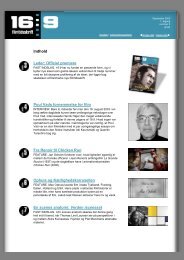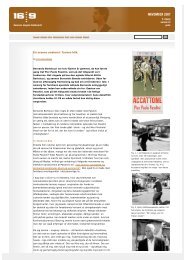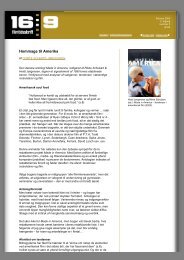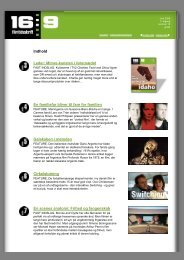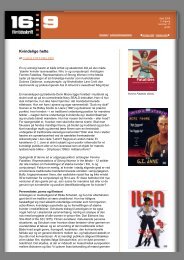Create successful ePaper yourself
Turn your PDF publications into a flip-book with our unique Google optimized e-Paper software.
the aversion is concretized to a fuller extent:<br />
I'm not a particularly gregarious fellow. If anything, I suppose I'm a bit on the<br />
misanthropic side. I've tried being a jolly good club member, but after a month or<br />
so my mouth always aches from baring my teeth in a false smile. The pseudofriendliness,<br />
the limp handshake and the extra firm handshake (both of which<br />
should be abolished by the Health Department), are not for me. This also goes for<br />
the hearty slap-on-the-back and the all-around, general clap-trap that you are<br />
subjected to from the All-American bores which you would instantly flee from if you<br />
weren't trapped in a clubhouse. (G. Marx, 1959: 320)<br />
In the remainder of his account, specific grievances Groucho had<br />
against the Friar's Club (alias "Delaney Club") come to light:<br />
Some years ago, after considerable urging, I consented to join a prominent<br />
theatrical organization. By an odd coincidence, it was called the Delaney Club. Here,<br />
I thought, within these hallowed walls of Thespis, we would sit of an evening with<br />
our Napoleon brandies and long-stemmed pipes and discuss Chaucer, Charles Lamb,<br />
Ruskin, Voltaire, Booth, the Barrymores, Duse, Shakespeare, Bernhardt and all the<br />
other legendary figures of the theatre and literature. The first night I went there, I<br />
found thirty-two fellows playing gin rummy with marked cards, five members<br />
shooting loaded dice on a suspiciously bumpy carpet and four members in separate<br />
phone booths calling women who were other members' wives.<br />
A few nights later the club had a banquet. I don't clearly remember what the<br />
occasion was. I think it was to honor one of the members who had successfully<br />
managed to evade the police for over a year. The dining tables were long and<br />
narrow, and unless you arrived around three in the afternoon you had no control<br />
over who your dinner companion was going to be. That particular night I was sitting<br />
next to a barber who had cut me many times, both socially and with a razor. At one<br />
point he looked slowly around the room, then turned to me and said, "Groucho,<br />
we're certainly getting a lousy batch of new members!"<br />
I chose to ignore this remark and tried talking to him about Chaucer, Ruskin and<br />
Shakespeare, but he had switched to denouncing electric razors as a death blow to<br />
the tonsorial arts, so I dried up and resumed drinking. The following morning I sent<br />
the club a wire stating, PLEASE ACCEPT MY RESIGNATION. I DON'T WANT TO<br />
BELONG TO ANY CLUB THAT WILL ACCEPT ME AS A MEMBER. (G. Marx, 1959: 320-<br />
321)<br />
Allowances should certainly be made for a good deal of exaggeration in<br />
the account cited above. Much of it is tongue-in-cheek, and designed to<br />
entertain the reader. However, the basic picture, regarding Groucho's<br />
attitude toward the Friar's Club, can undoubtedly be taken at face value.<br />
If the two accounts – the son's and the father's – are allowed to<br />
complete each other, we can conclude that the full sequence of events<br />
probably looked <strong>som</strong>ething like this:<br />
1) Groucho allows himself to be talked into joining the Friar's Club, though he<br />
doesn't like clubs in general.<br />
2) He quickly becomes fed up with this club in particular, because of what he sees<br />
as its low intellectual and ethical standards.<br />
3) The last straw is the final offensive remark in a series of insults to which he is<br />
subjected by a member of the club.<br />
4) Groucho notifies the club that he is quitting, inoffensively giving as his excuse<br />
that he just doesn't have time to participate in the club's activities.<br />
5) Unhappy about Groucho's resignation and sensing that there may be more to it<br />
than the comedian is letting on, club members press him for the "real" reason.<br />
6) Wanting to be done with this entanglement once and for all, Groucho pretends to<br />
disclose the real reason in the famous telegram, and is left alone from then on.<br />
Seen in this light, it is clear that the "Resignation Joke" was invented to<br />
fulfill a tactical purpose: that of extricating Groucho from an unpleasant<br />
situation, by discouraging any further efforts on the part of club<br />
members to obtain a fuller explanation as to his reasons for resigning.<br />
But why did it work? To <strong>som</strong>e degree, the apparent self-disparagement<br />
may have had a disarming effect. However, I suspect that two<br />
properties of the telegram played an even more important role in<br />
enabling it to fulfill its intended social function.<br />
One of those properties is a defiance of logic of essentially the same<br />
type as that found in impossible figures which induce cognitive<br />
confusion by violating their own logic in so logically compelling a<br />
manner that we cannot grasp how they fit together.



